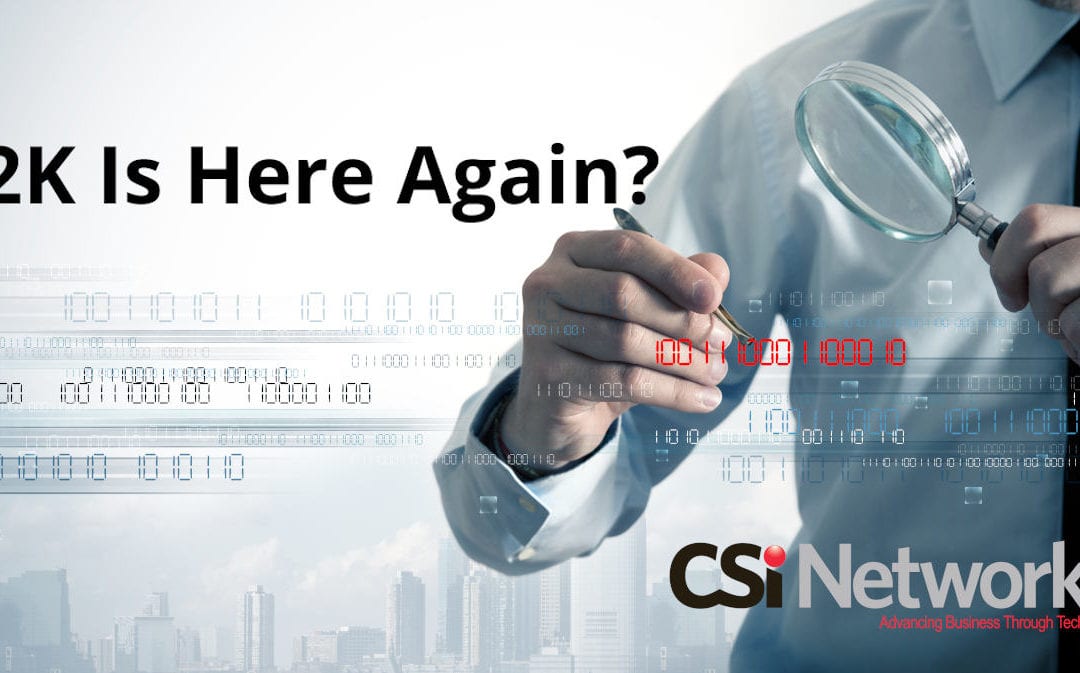Hey, remember, back in 1999 when everyone was terrified that the world as we knew it would come to a screeching halt due to computer errors? – the dreaded Y2K or Millennial virus (even though there wasn’t one)?
Of course, those of us who were there recall that almost nothing stopped or even slowed down, thanks to some quick-thinking problem solvers. But now, it seems that those clever fixes may be back firing on us.
It Was Never About the Year
To really understand things, we need to go back to the birth of computers and the Internet , which is actually farther back than most people think, but that’s a tale for another time.
The popular date that most computer programmers like to look at is 01/01/1970. Referred to as Unix time, most computer programming languages and systems calculate dates and times as seconds since January 1, 1970… all well and good.
But, to save memory, back when it took a small apartment to house a computer, computer programmers opted to use a smaller factor to record dates. It made sense. Humans seldom write down 12/13/1970, they naturally shorten it to 12/13/70, and using only 6 digits saved, at that time, loads of memory.
Not so much these days, when you can fit terabytes of memory in a drive smaller than your finger. (For reference, 1 terabyte = 694,444 floppy disks of the 3.5″ 1.44MB variety.)
But since the computers weren’t programmed to go into double aughts, it was believed that all computer based systems would stall, putting us back into the near dark ages that reflect the dates.
The Easy Way or the Hard Way
Two solutions were proposed to the problem. You could rewrite the code entirely, adding the extra two digits for the year.
Or you could use a quick fix – a minor code adjustment that told the computer to treat all dates from 00 to 20 as the 2000’s, not the 1900’s. This was referred to as “Windowing.”
Humans, well, we tend to have a habit of being lazy. So, even though the memory was available, around 80% of systems used the quick fix to protect themselves from the turn of the millennium.
Now if you’re clever, you’ve already spotted the problem. But in case you missed it, we used a temporary fix on most of the computers that would last until December 31, 2019…
Less is Moore’s Law
So in 1965, Gordon Moore, the co-founder of Fairchild Semiconductor and then CEO of Intel, wrote a technical paper, in which he described a computer phenomenon that postulated that computers, on their projected, continued path, would get smaller and cost less every year, while doubling their processor speed. It was later adjusted to a 2-year cycle.
And then Apple released the iPhone.
Moore’s Law, which had made the iPhone possible in the first place, was now sidelined, in large part because we started shifting our focus. The very first iPhone had significantly more computing power than the systems that sent men to the moon in 1969. Other computer manufacturers followed suit, creating the world according to smart phones.
But instead of mapping the future of interstellar travel – we suddenly became obsessed with all the games and apps we could get on our smart phones.
Five years ago, the current head of Intel predicted that Moore’s Law was quickly becoming obsolete. Computers had hit a plateau.
And Now the Windowing is Closed
Despite Moore’s Law, in large part due to the proliferation of smart phones and our natural tendency to do and spend as little as possible, we held onto computers longer than anyone imagined. Especially in government systems, retail store checkouts, parking meters, and so on
In November of 2019, a company called Splunk announced that they had realized their error, with elaborate fix instructions. Splunk is a San Francisco-based data intelligence platform provider that specializes in data monitoring software and business analytics. You may not have heard of them, but their customer base of approximately 19,000 users likely includes companies with which you do business.
And at least they were honest about it.
Just last week, some credit card users had their purchases denied, because of the date errors. Parking Meters across New York City, of all places, failed or refused pre-paid cards due to the date change. Even a popular new video game crashed due to the issue.
And no one knows how many other systems may be being affected, or about to be affected, based on the now defunct “windowing” solution.
Oh… and this won’t be the end of this sort of thing. We might get a little bit of a breather, but we already know about the Y2K38 problem. At least we have a few more years to tackle that one!
System Solutions You Can Trust
If you still have computers that are 20+ years old, you may already be experiencing issues. Issues that may multiply now that Microsoft has ended its support for Windows 7. And don’t get us started on the old 32-bit systems.
Don’t wait to get those systems checked until something crucial becomes a larger problem. Contact us at CSi Networks. We’ll come in and examine your systems – often as a free consult – and let you know what needs to be done. And we always have our customer’s backs for future issues and concerns. Let us be your computer solutions expert, and get real peace of mind.
